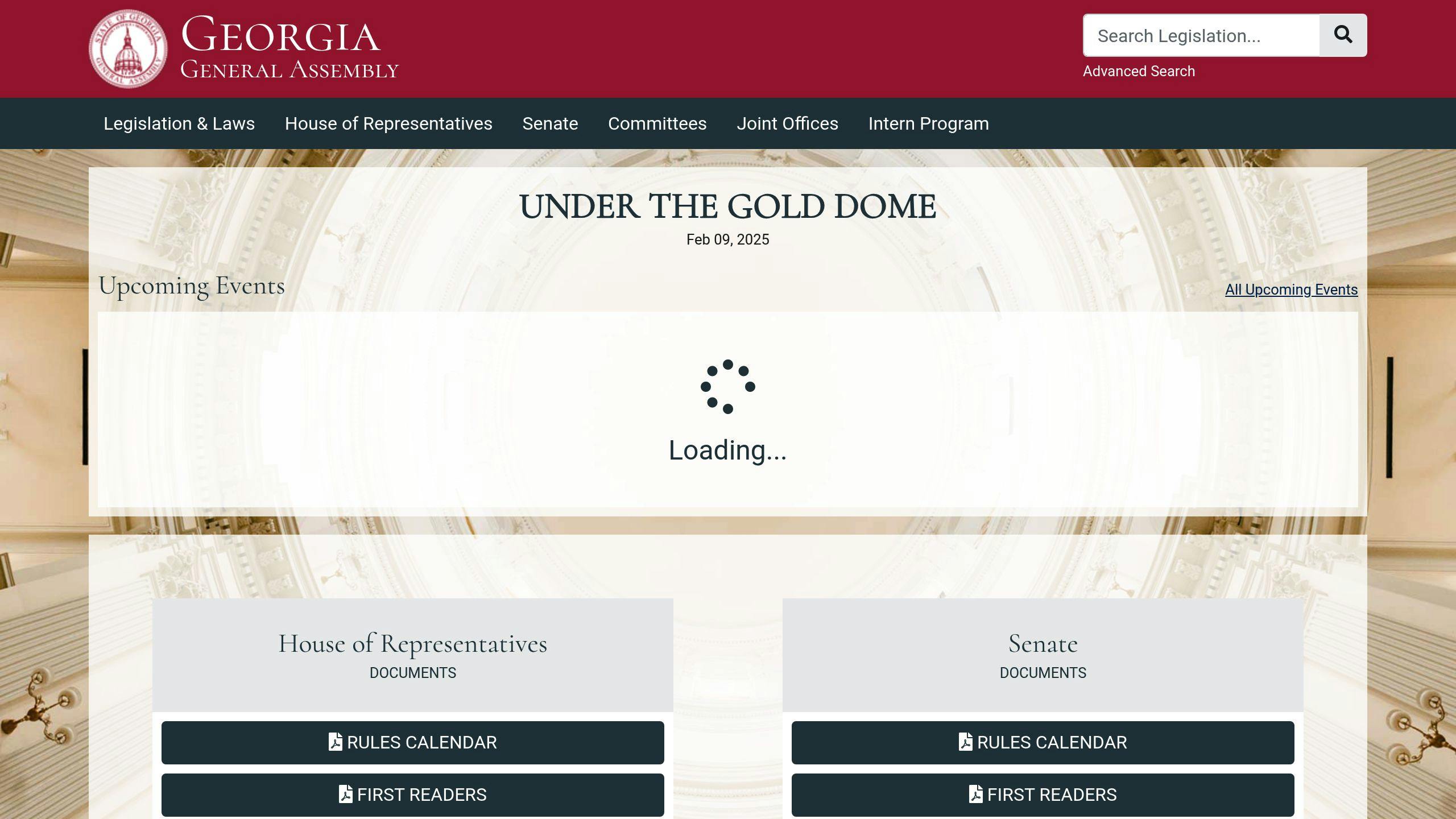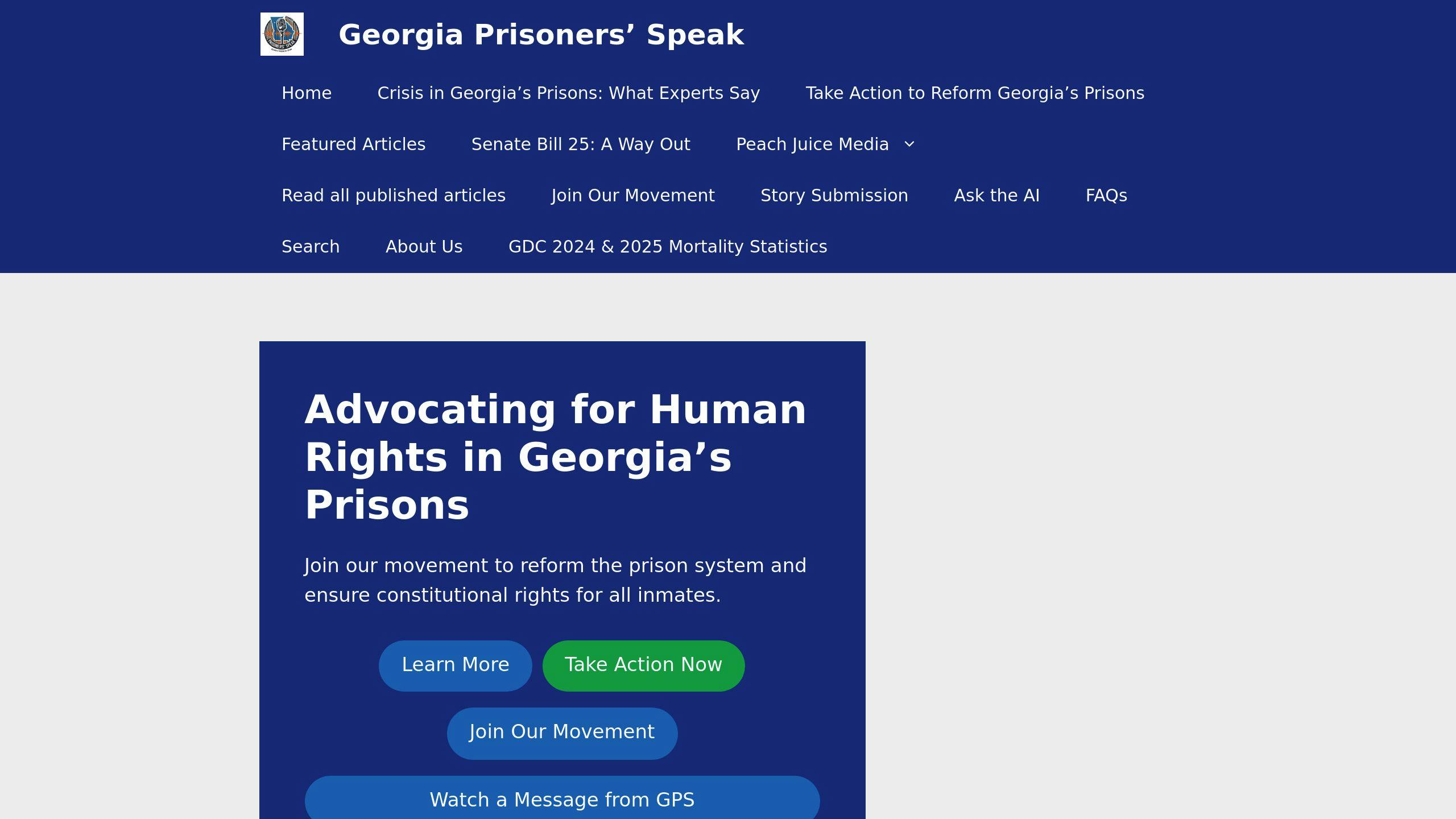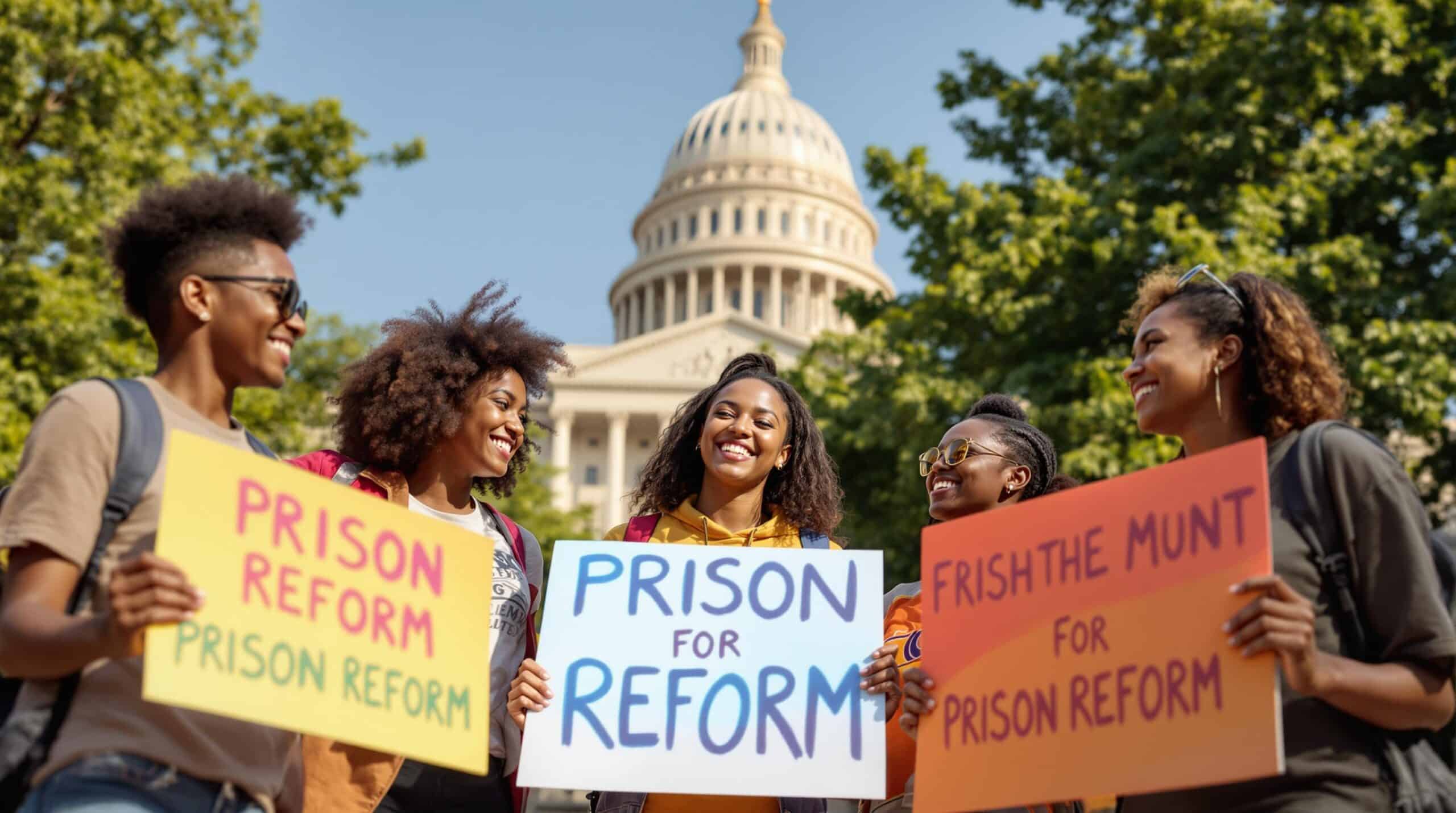Want to influence laws as a student in Georgia? Here’s how you can make a difference in prison reform through legislative advocacy.
- Key Steps to Advocacy: Learn how bills are introduced, reviewed, and passed in Georgia’s 40-day legislative session. Key dates include Crossover Day (Feb 10, 2025) and Sine Die (March 12, 2025).
- Effective Tools: Use resources like the Georgia General Assembly website, Impact Justice AI, and GPS incident reports to track bills and support your arguments.
- Testimony Tips: Prepare concise, data-backed 3-minute statements for hearings, and follow strict registration rules.
- Student Success Stories: Georgia State University students increased prison education funding by 15% in 2024, showcasing the power of clear data and collaboration.
Ready to get started? This guide breaks down everything you need to know about Georgia’s legislative process, advocacy tools, and success strategies.
Related video from YouTube
How Laws Are Made in Georgia
To navigate the process of turning bills into laws, it’s important to align advocacy efforts with the legislative process and key calendar deadlines.
Steps in the Bill-to-Law Process
- Introduction: Work with bill sponsors during the filing of the bill.
- Committee Review: Provide written testimony (formatted in 12pt Times New Roman).
- Public Hearings: Present concise, 3-minute oral statements.
- Floor Votes: Encourage constituent outreach ahead of voting sessions.
- Opposite Chamber: Monitor for any amendments made to the bill.
- Governor: Make a final push for advocacy before the governor’s decision.
Each phase offers specific opportunities for student advocates to impact prison reform legislation. For example, the House Judiciary Non-Civil Committee is a key player in handling prison-related bills, making it an essential target for focused advocacy.
Key Legislative Calendar Dates
- Feb 10, 2025: Final day for bill introduction (Crossover Day).
- Budget Weeks: Debates on funding for the justice system.
- March 12, 2025: Last day of the legislative session.
Finding and Tracking Bills
Advocacy efforts are most effective when you keep up with legislative schedules and track bills in real-time. The Georgia General Assembly website is a key resource for following prison reform legislation. Its search tools allow you to focus on specific bills by number or keyword, while also keeping tabs on committee assignments and amendment updates.
Georgia General Assembly Website Guide

To stay on top of legislation, make the most of the website’s features:
- Search for bills using keywords like "prison reform" or by entering specific bill numbers.
- Set up email alerts for updates on bills such as HB 1123 (2023 Prison Reform Act).
- Check daily floor calendars to see when debates are scheduled.
- Review committee meeting schedules and voting records.
- Use the text comparison tool to track changes in complex bills like SB 42 (2024 Sentencing Reform).
- Subscribe to automatic updates on specific bill dockets [6].
Pairing these tools with prison-related data from GPS can give you a more comprehensive view of the issues.
Advocacy Resources
GPS offers a searchable database of over 500 verified incident reports, which helps students evaluate proposed reforms by comparing them to real prison conditions [2].
Additional advocacy tools include:
- Open States: Analyze committee votes using legislator scorecards.
- LegiScan: Compare Georgia bills to similar reforms in other states.
- Ignite Justice: Receive weekly alerts on priority legislation.
Data Sources for Advocacy
Back up your arguments with GPS’s recent grievance reports (120+ from Q3 2023) [2], Georgia’s 34% recidivism rate, and its ranking as the 4th highest state for incarceration [5].
To streamline advocacy, create templates that track:
- Bill numbers and their current status.
- Stakeholder perspectives.
- Relevant GPS evidence and case studies.
- Supporting statistics and data.
Working with Legislators
Once you’ve identified priority bills using tracking tools, it’s time to engage directly with lawmakers. For Georgia students, focused outreach and smart use of digital tools can make advocacy efforts much more effective.
How to Contact Representatives
When reaching out to legislators, keep these tips in mind to ensure your message is clear and impactful:
- Identify yourself clearly: Mention your student status and district address, and reference the specific bill (e.g., HB 235 Prison Education Programs).
- State your request upfront: Be direct about what you’re asking for in the opening line.
- Back it up with evidence: Share personal experiences or data, like GPS reports or recidivism statistics, to support your position.
Timing matters. Reaching out during district work periods – when legislators are more available for meetings – can increase your chances of being heard.
Creating Advocacy Networks
Teaming up with established organizations can help amplify your efforts. For example, Georgia Prisoners’ Speak (GPS) offers various ways for students to collaborate:
- Analyze reports: Use GPS prison data to bolster your case.
- Join campaigns: Participate in letter-writing initiatives.
- Prepare testimony: Leverage GPS evidence, as seen in the 2020 grievance campaign [2].
When working with advocacy networks, ensure clear communication and adhere to GPS protocols, especially when handling contributions from incarcerated individuals [2].
Digital Advocacy Tools
Digital tools can streamline your advocacy efforts and help you target the right people. Here are two tools worth exploring:
| Tool | Purpose | Key Feature |
|---|---|---|
| Impact Justice AI | Legislative Analysis | Tracks voting patterns |
| Open States API | Bill Tracking | Provides real-time alerts |
To measure how well your advocacy is working, monitor metrics like:
- The number of co-sponsors added to your bill
- Invitations to participate in committee hearings
- Engagement rates on social media [3][6]
Using these tools and strategies, you can boost the effectiveness of your advocacy and make your voice heard.
sbb-itb-7858f51
Speaking at Legislative Hearings
Testifying at Georgia legislative hearings requires preparation and an understanding of the rules. A well-delivered testimony can influence prison reform decisions. Building on tracking and outreach strategies discussed earlier, here’s how to make the most of your time in front of lawmakers.
Writing Your Testimony
To craft an effective testimony, focus on a clear structure that communicates your message:
| Section | Key Elements |
|---|---|
| Introduction | Share your name, student status, and bill number. |
| Position Statement | Include key statistics and data from the Georgia Department of Corrections (GDC). |
| Personal Impact | Highlight your own experiences or relevant research. |
| Call to Action | State a specific request for legislative action. |
Consider using tools like Impact Justice AI to turn GDC data into visual aids that strengthen your presentation.
Hearing Guidelines
The Georgia House enforces strict rules for testimony. You must register at least 48 hours before the hearing, and presentations are typically limited to three minutes. Violations of decorum under O.C.G.A § 28-1-12 can result in a one-year ban from hearings.
For hybrid hearings, test your technology in advance according to the legislature’s guidelines. Data shows that 23% of prison reform advocates received formal warnings during 2023 hearings, underscoring the need to follow all procedures carefully.
Personal Stories in Advocacy
Incorporating personal stories, especially from incarcerated individuals, can make your testimony more impactful. Following established protocols ensures your advocacy aligns with successful strategies, like the GPS 2020 grievance campaign [2]. For instance, GPS’s 2024 White Paper led to a 68% increase in media coverage of testimony.
To prepare effectively, use this four-step approach:
- Anticipate potential questions.
- Research opposing viewpoints.
- Organize supporting evidence.
- Practice your responses.
Leverage tools like Impact Justice AI’s hearing simulator to refine your ability to handle challenging questions with confidence.
Student Advocacy Success Stories
When students effectively prepare and present their testimony, it can lead to real policy changes. Let’s look at two Georgia examples that highlight this impact:
GSU Prison Education Project Results
At Georgia State University, student advocates made waves by pushing for increased funding for prison education programs. Their efforts paid off with a 15% boost in state funding for correctional education initiatives in 2024 [5].
The key to their success? Presenting compelling data. They showcased how prison education programs cut recidivism rates by 43% and save the state around $20,000 per inmate annually in incarceration costs [5].
| Metric | Outcome |
|---|---|
| Funding Growth | 15% increase (2024) |
| Annual Savings | $20,000 per inmate |
| Recidivism Drop | 43% |
| Student Participation | 22% year-over-year growth |
These numbers highlight the power of using clear, well-researched data to influence lawmakers.
Georgia Prisoners’ Speak Media Impact

Georgia Prisoners’ Speak (GPS) took a different approach, using media and documentation to amplify their advocacy. Their strategy included:
- Video documentation during Department of Justice inspections to expose discrepancies between reported and actual prison conditions, prompting federal investigations [2].
- Social media campaigns through accounts like @TheyHaveNoVoiceGA to maintain public and legislative attention on prison reform.
- FOIA requests to uncover critical information, leading to legislative hearings.
Next Steps for Student Advocates
Making progress in advocacy requires a clear strategy and consistent action. Here’s how to move forward effectively:
Getting Started Guide
Kick off your advocacy by identifying your state legislators using the Open States tool [1][6].
Make sure you have the right tools at hand:
| Resource | Purpose |
|---|---|
| GA Assembly Bill Tracker | Keep track of legislation progress |
| Impact Justice AI | Analyze legislative patterns and draft outreach |
| Open States District Lookup | Locate your representatives |
When reaching out to legislators, be sure to include:
- Your status as a constituent
- Specific bill numbers (e.g., "SB 234")
- Your student affiliation
- A clear and actionable request
Long-term Advocacy Planning
Advocacy is a marathon, not a sprint. To create lasting change, plan beyond a single legislative session. The Georgia Assembly’s legislative calendar helps guide your efforts:
Pre-Session (November-January): Use this time to educate legislators with policy briefings and prepare data to support your position.
Active Session (January-March): Stay in regular contact, especially during committee hearings. Collaborate with advocacy groups like GPS to strengthen your efforts [2].
Post-Session (April-May): Send thank-you notes and submit interim study requests. Focus on these tasks:
- Review outcomes and strategize for the next session
- Build coalitions with like-minded groups
- Document what worked and why
"Frame issues through prison labor economics"
To stay on track, conduct quarterly reviews to assess:
- Progress of bills
- Legislator engagement and response rates
- Media coverage on prison reform
- Growth of your coalition
- Measurable policy changes
Teaming up with established organizations can amplify your work. For example, GPS offers volunteer opportunities in evidence collection [2], while the Georgia Reentry Initiative provides data on gaps in prison education programs [5].
FAQs
What happens to most bills introduced in the Georgia General Assembly?
Once bills pass both chambers, they are sent to the governor at the end of the session, known as Sine Die (set for March 12, 2025). The governor then has 40 days to either sign or veto them. Understanding this timeline is crucial for planning advocacy efforts. For example, Georgia State University (GSU) students successfully timed their prison education funding campaign around these deadlines.
Key moments like Crossover Day (February 10, 2025) are critical. Around 61% of prison reform bills fail to progress past this date [3][4]. Tools like Impact Justice AI analyze historical trends to pinpoint the best times for testimony and advocacy, helping students focus their efforts at the right moments.
Student advocates can learn from GSU’s Prison Education Project, which secured funding increases by using multi-session strategies. Combining these approaches with coalition-building techniques, as outlined in Long-term Advocacy Planning, can lead to more lasting results [2].
